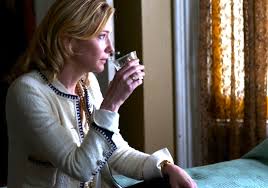Disappointing Blue Jasmine – Woody Allen. Woody was, is and always will be more a Lubitsch than a Bergman

Cate Blanchett - Blue Jasmine
![]()
Blue Jasmine – Woody Allen
Woody Allen is blessed. He has a God-given gift. That gift is to make us laugh: with an articulate wit, incisive irony, and a delicious sense of the personal and metaphysical absurdity of life. Camus in drag.
His gift as an artist, is not to make us cry; to move us deeply. If the man has a melancholic, dark perspective on life and personal relationships; it is the artist who rescues him and us, with flashes of manic rebellious humour which we all instantly identify with and share. In Shakespearean terms it is his destiny to be the Fool who is always observer and commentator on the tragedies of hubris and flawed ambition that play out around him. Always the watcher: never a player. He has the mind of a Lear but the soul of a Fool; the desire of a Romeo but the heart of the Apothecary – a facilitator in the destiny of others.
Like many others before him blessed with the gift of laughter, but more culpably than most, because he has the intellect and insight to know better, Woody is drawn to the tragic to the point of undervaluing the comic genius which is his greatest talent.
There is much to admire in Blue Jasmine – not least of course Cate Blanchett’s tour-de force reincarnation of Streetcar’s Blanche Dubois. As ever with Allen the direction is austere, impeccably structured and satisfyingly unobtrusive. But just as with Tennessee Williams’s iconic play with which it has inevitably been compared, Allen’s even more shallow, domesticated script doesn’t have the substance to sustain Blanchett’s peerless performance of it. Indeed there is a sense in which Blanchett is miscast: not because she can’t handle the role; but paradoxically because she is just too strong a screen presence for an essentially shallow character – as written. There are moments in Blue Jasmine when Blanchett’s intelligence and powerful presence almost topples Allen’s Jasmine as written into someone more interesting but at odds with the rest of the film.
Jasmine is a lady-who-lunches, socially connected New York wife of a wealthy husband, financial entrepreneur, i.e. crook, Hal (Alec Balwin at his sleazily smarmy best). Everyone, including Jasmine’s sister lady-lunchees, knows the gobsmackingly obvious fact that Hal is a serial philanderer with an emotional age yet to reach double figures. When true to stereotype, Hal falls in lust with one of his youthful dalliances, Jasmine decamps to LA to join her sister adoptee Ginger trapped in a downbeat, daily grind of the supermarket checkout and surrounded by blue-collar Neanderthal guys whose most dedicated investment is in their burgeoning beer guts.
British actress Sally Hawkins does what she can with Ginger but as Allen has no feeling for the authenticity of blue-collar guys and the American working class has a different tone and voice than the British, it doesn’t really work. Ginger’s estranged husband Augie then new beau Chili (yeah, really) Bobby Cannavale look like uncomfortable refugees from Working Girl where at least their stereotypical blue-collarness was used for a comedy of manners and social mores.
Augie and Ginger’s once-in-a-lifetime chance for financial stability rested on a $200K lottery win which went down the tubes when they invested in one of Hal’s pyramidal scams which eventually brought his and Jasmine’s wealthy life-style to an abrupt end.
So, luggaged by Louis Vuitton and fresh from a First Class flight from New York, Jasmine dumps herself on Ginger claiming that she is penniless. She makes dispiritingly half-baked efforts to adjust to the new financial and social realities of her plight but despite Blanchett’s best efforts, she remains an unlikeable snobby woman with delusions of a grandeur she never had; only with the husband-generated illegal wealth to fake it. Our only route to empathy or sympathy for Jasmine is to see her as wronged victim: but it would be hard to find an actress less suited to play victim than Cate Blanchett.
Efforts by Chili to set Jasmine up with a bloke who could get her out his weirdly coiffed hair and out of Ginger’s inadequately small flat are embarrassingly predictable and unconvincing. One longs for some lightness of touch, some style, irony – something to make us at least smile for God’s sake. But no, Woody just plays his faltering storyline and script absolutely straight.
This tale of a rather silly, indulged, kept, wealthy woman losing all her privileges through nothing more interesting than being traded in for a younger model makes it hard to care very much what happens to whom. As set up, like the now dated Streetcar Named Desire, the deepest emotion Allen can tilt for, from the very beginning is pathos. And it is true Blanchett’s talent manages to touch us briefly at the end. But there is nothing here to compare with Claire Bloom’s luminous, ethereal quality of a woman with a raw emotional sensitivity and other-worldly fragility that disabled her from the visceral reality of life. Pathos has to emerge: if you chase it, it always looks contrived.
Woody has no feeling for the expression of intimacy in personal relationships film offers: though the camera is always voyeur, it does not have to be voyeuristic. Allen is not the only Director to fail this test – David Lynch and Bertolucci are two others.
The real tragedy for me is that if, instead of following the twisty, labyrinthine paths of his personal angst into emotional territory for which he has no real instinct, Woody had honed his genius for comedy, he could have produced some timeless, perfectly achieved, comedies that would have lasted for ever. He was, is, and always will be, more of a Lubitsch than a Bergman.
Filed under: 2 star, Drama, General, Hollywood, Woody Allen

